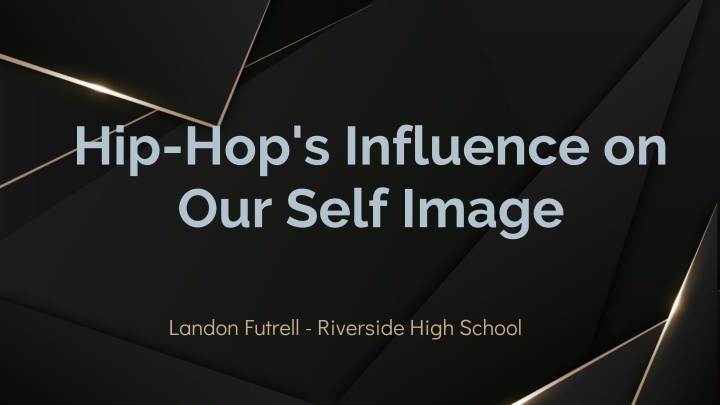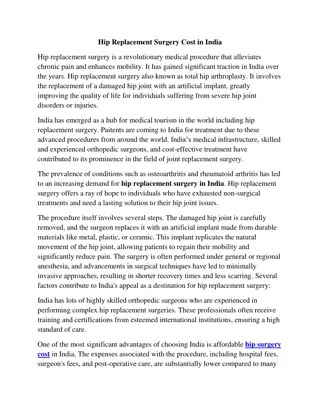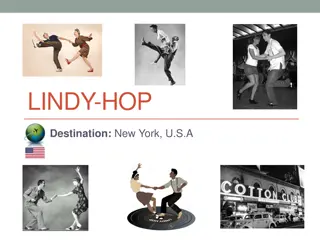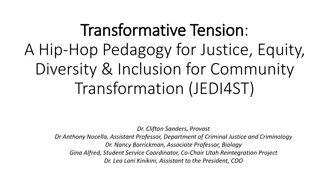Impact of Hip-Hop on Black Male Self-Image
Self-image development is influenced by various factors, including media and culture. This study explores how hip-hop music contributes to shaping stereotypes and masculinity in young Black men, impacting their self-concept and psychological development. The research delves into the representation of Black men in media and music, analyzing the effects on young Black boys' self-image and perceptions of masculinity.
Download Presentation

Please find below an Image/Link to download the presentation.
The content on the website is provided AS IS for your information and personal use only. It may not be sold, licensed, or shared on other websites without obtaining consent from the author.If you encounter any issues during the download, it is possible that the publisher has removed the file from their server.
You are allowed to download the files provided on this website for personal or commercial use, subject to the condition that they are used lawfully. All files are the property of their respective owners.
The content on the website is provided AS IS for your information and personal use only. It may not be sold, licensed, or shared on other websites without obtaining consent from the author.
E N D
Presentation Transcript
Hip-Hop's Influence on Our Self Image Landon Futrell - Riverside High School
Introduction Self image development is shaped by one s parents, peers, media, and culture. Hip-Hop Music is one of the most popular genres of music today. As Hip-Hop s popularity grows, so does the rise in certain stereotypes, particularly in young Black men. Hip-Hop can create a sense of toxic masculinity that has lasting effects on young people s psyche. This creates a trickle-down effect where young black men who are listening to hip-hop take part in the masculinity that is portrayed in the music, even if it's not a part of healthy masculinity
Terminology Masculinity Self Image Self Concept Black Masculinity Toxic/Healthy Masculinity
Research Question (is this final? In what ways does the representation of Black men in media and music impact the development of young Black boys' self- concept?
Thesis Social and psychological development in young Black boys is often influenced by the stereotypical representations and varying versions of masculinity portrayed in rap music and social media.
Methodology The research for this paper was collected using secondary sources through a review of the literature. The primary disciplines that were examined were Cultural Anthropology, African-American studies, Sociology, and Pop Culture.
Limitations Lack of research in this topic impacted the access to information Analyzing and defining masculinity
Perceptions of Black Men in America The American Psychological Association s Journal of Personality and Social Psychology explored stereotypes about perceptions of male bodies in one recent study. The study found non-black participants believed Black men to be more capable of physical harm than white men of the same size. Black masculinity is the intersection between race and gender. Stereotypically in America. In a recent BLM (Black Lives Matter) protest, a Black activist Curtis Hayes Jr. is seen shedding tears and expressing emotion to a younger Black male, 16 year old Raymond Curry. Hayes says he was explaining that his generation failed to protect our Black male community.
Representation of Black men in Hip-Hop In Hip-Hop rappers represent themselves in a lot of different ways. Rap is a musical expression of past experiences with storytelling. With the way Rap has evolved, the image for rappers has changed for the worse. Information from Pew Research Center states, More than seven-in-ten among the U.S. public, including large majorities of both blacks and whites, offer a negative assessment of rap music, with 71% of blacks and 74% of whites agreeing that rap s societal impact is bad (Pew Research Center, pg.1). In a lot of Hip-Hop, rappers tell a story and try to represent their masculinity. This leads to younger black boys developing the concept of certain ideas they believe they need to do in order to become masculine such as embracing materialism in dress, speaking about mature topics, and engaging with others in aggressive or toxic ways, historically.
Recommendations One approach to addressing the spread of toxic masculinity is guided listening. Guided listening could be when parents or guardians show younger audiences different types of music that is right for the setting. Teachers are not prohibited to playing music but they do have some exceptions. An explicit or parent advisory labeled songs; according to law, are not appropriate until the age of 16. Another suggested solution could be a limitation. Not only should adults guide youth in music, but if necessary limit or monitor the intake.
Conclusion Rap and hip-hop have a mixture of messages that can influence young black men s concepts of masculinity in different ways. Artists like Drake (Aubrey Drake Graham) have songs that mention derogatory terms and ways of rich living that are idolized by the masses. And then there are artists like Jay-Z and the way their messages changed with maturity and experience. The way this affects black masculinity is the ways young black men view themselves by unconsciously being influenced by rappers' and artists' lifestyles.
Work Cited https://rc.richmond.edu/masculinity/image.html https://slidesgo.com/theme/darkle-slideshow#search-dark&position-4&results-619 https://www.britannica.com/art/hip-hop https://my.clevelandclinic.org/health/articles/12942-fostering-a-positive-self-image https://www.semanticscholar.org/paper/Authentic-Ideals-of-Masculinity-in-Hip-Hop-Culture%3A-Morris/6






















